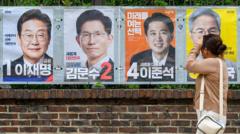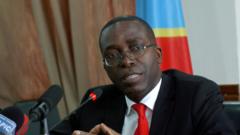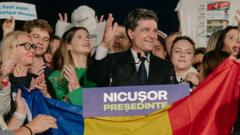As South Korea gears up for its presidential election set for June 3, Lee Jae-myung has surged to the forefront despite a background filled with controversies and legal challenges stemming from his past political actions and decisions.
Political Turmoil Paves the Way for South Korea's Presidential Contender

Political Turmoil Paves the Way for South Korea's Presidential Contender
The chaos of recent political events has positioned Lee Jae-myung as the leading candidate for South Korea's presidency.
Lee's rise can be attributed to a constitutional crisis ignited by former president Yoon Suk Yeol's failed declaration of martial law on December 3, 2024, which effectively galvanized support for his candidacy within the Democratic Party after the controversial events that unfolded in its wake.
Lee, who has previously faced legal troubles, including corruption allegations and conviction for making false statements during past campaign debates, was initially perceived as an underdog before the political upheaval allowed him to capitalize on voter discontent.
The former mayor and governor of Gyeonggi Province, who turned to politics after a career as a human rights lawyer, presents a compelling narrative of perseverance, having risen from humble beginnings to become a significant political figure.
Though Lee's controversial approach and focus on progressive reforms have polarized opinions, they also resonate deeply with many citizens frustrated with the status quo.
Despite facing a barrage of scandals, including a brutal assassination attempt, Lee has demonstrated resilience and strategic adaptability.
After the martial law attempt led to mass protests and the eventual impeachment of Yoon, Lee quickly shifted into campaign mode, building momentum ahead of the imminent election.
With ongoing legal battles looming, including potential ramifications that could affect his candidacy, the political landscape in South Korea remains volatile and uncertain as the public eagerly anticipates the implications of Lee's possible presidency in the coming months.
The shifting dynamics illustrate the profound influence of political crises on electoral outcomes, indicating that South Korea’s journey through these turbulent times is far from over.
In some ways, the nation stands at a crossroads, navigating the complexities of leadership, public trust, and political legitimacy, as it approaches a critical juncture in its democracy.
Lee, who has previously faced legal troubles, including corruption allegations and conviction for making false statements during past campaign debates, was initially perceived as an underdog before the political upheaval allowed him to capitalize on voter discontent.
The former mayor and governor of Gyeonggi Province, who turned to politics after a career as a human rights lawyer, presents a compelling narrative of perseverance, having risen from humble beginnings to become a significant political figure.
Though Lee's controversial approach and focus on progressive reforms have polarized opinions, they also resonate deeply with many citizens frustrated with the status quo.
Despite facing a barrage of scandals, including a brutal assassination attempt, Lee has demonstrated resilience and strategic adaptability.
After the martial law attempt led to mass protests and the eventual impeachment of Yoon, Lee quickly shifted into campaign mode, building momentum ahead of the imminent election.
With ongoing legal battles looming, including potential ramifications that could affect his candidacy, the political landscape in South Korea remains volatile and uncertain as the public eagerly anticipates the implications of Lee's possible presidency in the coming months.
The shifting dynamics illustrate the profound influence of political crises on electoral outcomes, indicating that South Korea’s journey through these turbulent times is far from over.
In some ways, the nation stands at a crossroads, navigating the complexities of leadership, public trust, and political legitimacy, as it approaches a critical juncture in its democracy.


















